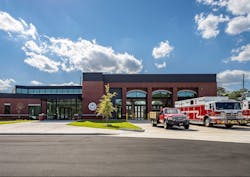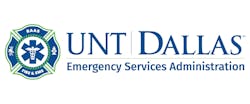Back to School: A Path of Study that Works for You
If you decided to further your studies in the fire service by going back to college, you’ll find that you have more options than those that traditionally existed. It’s worth the time to examine the options beforehand to select a learning path that works best for you as a learner, aligns with your professional responsibilities, and takes into consideration the effect on your personal and family life.
Odds are that if you request undergraduate degree program information from a college, you’ll receive details about the school’s associate degree and bachelor’s degree programs. However, many institutions of higher learning offer other programs of study as well as certificate degree and micro-credential learning programs. The latter two are geared toward professional studies in a slightly different manner than the others and require different levels of time commitment.
Undergraduate programs
For comparison sake, most associate degree programs are called two-year programs, because they are designed to be completed by a full-time student over two years or four semesters. Full-time participation would consist of a student attending 4–5 courses each semester and accumulating about 60 college credits.
Associate degree programs can be found at community colleges and four-year colleges and at the university level. The associate programs typically are designed to address vocational or career-related skills and might incorporate classroom, knowledge-based and hands-on skill development learning. They cover majors that assist with entry into a fire service career and promotion within the fire service.
A major advantage to most associate degree programs is that they offer transferability to a bachelor’s program. This is important should students choose to further their study of a subject.
A program of study in a bachelor’s degree program tends to be more specialized and in-depth than the program of study that’s found in an associate-level program. Many bachelor’s degree programs incorporate classes that help to hone critical thinking and develop research skills and contain higher-level problem-solving/analysis components.
Bachelor’s degrees also are referred to as four-year degrees, because four years is the expected time frame that a full-time student would take to complete the program of study. The accumulation of credits for a bachelor’s degree is about 120 college credits.
Undergraduate options
There are options to jumping directly into a 60–120 college credit path of learning.
Certificate degree programs are groups of 4–7 college courses (12–21 total course credits) that pertain to a specific topic. Micro-credentials are groups of 3–5 specialized courses of study (9–15 total course credits) that focus on a single issue. Completion of either of these series of study serves as an indication to employers that you are maintaining relevancy in the field through the pursuit of education and professional development.
Certificate degree programs cover a subject area and give the student an in-depth understanding of that area. It’s important to find out whether the certificate degree program is credit-bearing, because this affects one’s ability to transfer the college credits to another degree program down the road.
Certificate degrees can be completed as a one-time, stand-alone program or can be paired with the program of study in an associate or bachelor’s degree. An example of the former is a manager who is looking to enhance business acumen by completing a five-course certificate program in business management. An example of the latter is a student who already is enrolled in a fire science program but uses available course offerings to better understand specific fire science fields by completion of a certificate degree in fire investigations, occupational safety & health or hazmat response.
Quite a few schools design their micro-credential programs to be competency-based via more hands-on or skill-learning opportunities in relation to the subject of study. These programs tend to focus on in-demand knowledge and skills and allow students to certify that they successfully met the requirement of the program. Enrollment in a school’s micro-credential program might make the most sense if you just want to learn more about a single fire service issue, such as labor relations, social media or data analysis, instead of committing to an entire degree program.
Many micro-credential programs go above and beyond the traditional college transcript and offer digital badging. According to Credly, which is a company that offers digital badging products, “a digital badge is a tangible representation of an individual’s competencies and skills. They are designed to be easily shareable and verifiable, typically containing verifiable data, such as the badge earner’s name, the issuing organization and the criteria met to earn the badge.” Once a student completes a course, the digital badge can be placed onto résumés, personal webpages, email signatures and professional websites, such as LinkedIn. The digital badge is a visual signal to colleagues and employers that you successfully participated in the program and that you met the program’s requirements.
Micro-credentials often are advertised as stackable credentials. This means that you can “stack” each micro-credential that was collected over time into certificate and associate degrees. For example, say that you are looking down the road at completing an associate degree program in business administration. You can start the program through the completion of two or three micro-credentials in specific topics, such as entrepreneurship, leadership, marketing, project management and accounting. Gaining each of these micro-credentials, at nine credits each, would put you well on the way to 60 college credits/an associate degree.
Both certificate programs and micro-credential programs are applicable to professional and career development, because they tend to be geared toward the emerging issues as well as the changing requirements of the workplace. This is because it’s easier for institutions to redevelop a 3–6 college course curriculum package than it is to change entire associate or bachelor’s degree programs.
Your choice
Consider what path of study works best for you by understanding your options and reviewing the requirements of each program. The program of study that you choose will allow opportunities for you to partake in individual and professional growth, gain a better understanding of the subject’s key concepts and problems, and participate in professional networking opportunities. The major decision factor might be how long of a path that you want to embark upon.
Product Showcase
FIRE & RESCUE TRAINING
Cumberland County Regional Fire and Rescue Training Center at Fayetteville Technical Community College provides extensive fire, rescue and swiftwater training in a new, state-of-the-art complex. The complex includes multiple burn buildings, an aircraft burn simulator, a rappelling tower that has high zipline capability, trench-collapse training that has confined space rescue capability and indoor swiftwater rescue training for year-round evolutions.
FAYTECHCC.EDU
EMERGENCY SERVICES ADMINISTRATION
The University of North Texas Dallas’ bachelor’s degree program in emergency services administration (ESA) utilizes Fire and Emergency Services Higher Education (FESHE) curriculum that’s adopted from the U.S. Fire Administration. This allows students to transfer as many as 84 credits. The program is 100 percent online. ESA majors gain valuable knowledge in the areas of management, leadership and community risk reduction.
UNTDALLAS.EDU
ONLINE CERTIFICATE PROGRAMS
Refresh your background in the profession, learn a new skill or add to your list of accomplishments by earning a certificate from Waldorf University. Learn from expert faculty through one of the institution’s 15-credit-hour online certificate programs. Certificate options include communications, emergency management, global leadership and leadership communications.
WALDORF.EDU/CERTIFICATES
The Basics
Most academic programs are based on obtaining a passing grade in a course and earning a certain amount of college credits. A typical 45-hour semester course is assigned three college credits. Each course that’s passed is another accumulation of credits on the path to completing the degree or program of study.
Many academic programs allow part-time status that can consist of a student tackling as little as one class per semester. Although taking the minimum number of courses possible might result in the best work/life balance, understand that many degree programs have a date by which you must become a fully enrolled student. A program also might have overall time frame requirements about when you start and complete a program no matter your full- or part-time status. It’s best to talk with a representative or advisor from the program before you embark on any plan of study.
Take the time to explore whether there are any workplace incentives to help you with your studies. It’s well worth the effort to discover whether your fire department might provide time off, reimbursement for course materials or tuition, or other economic and/or promotional incentives to complete a degree program or a certain amount of credit hours.
About the Author

Edward Tracey
Edward A. Tracey, Ed.D., is a 30-year member of the fire service who has served the past 20 years with the Rochester, NY, Fire Department. He serves as the Rescue Co. captain, including additional responsibilities tied to collaborative management of the department’s technical rescue training, response and typing programs. Tracey also serves as a fire service and technical rescue instructor for a statewide training system, sits on numerous curriculum development committees and serves as an adjunct professor. He has a doctoral degree in education from the University of Rochester, a master’s degree in public administration from SUNY Brockport and a bachelor’s degree in fire service administration from the University of New Haven.



